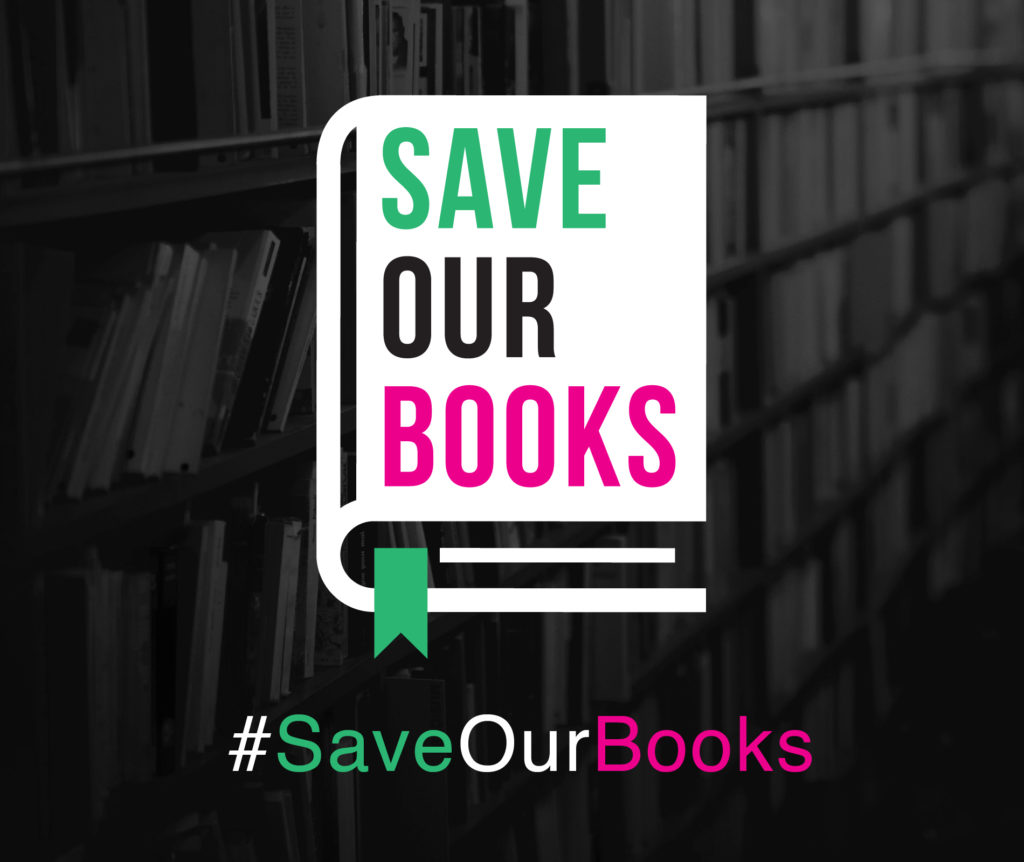Save Our Books campaign launches as IPO opens consultation

An alliance of organisations has launched the Save Our Books campaign in the face of a potentially devastating change to the UK’s copyright laws which could result in fewer books, by fewer authors, for fewer readers.
Save Our Books is a joint campaign from the Publishers Association, the Society of Authors, the Association of Authors’ Agents and the Authors’ Licensing and Collecting Society.
The government is reconsidering the UK’s approach to copyright and trade following Brexit. The Intellectual Property Office launched a consultation today (Monday 7th June 2021) which considers a weakening of copyright rules crucial for exporting books around the world and ensuring UK authors benefit financially from those sales.
Changing the way these rules, known as ‘copyright exhaustion’, work would present serious dangers for the health of the books industry, including:
- Significantly impacting authors’ livelihoods. Author royalties on export sales are much lower than what authors can earn from UK sales of books published for the UK market. If authors cannot prevent their copies from around the world being sold back into the UK, then an export sale risks eroding the corresponding domestic sale. Approximately two-thirds of authors’ incomes could be at risk on the sale of a book in this scenario. This would threaten the sustainability and diversity of UK authorship.
- Destroying creative export markets. The potential loss of up to 25% of the UK publishing industry’s revenue – almost £1bn – which would harm investment and could lead to publishing job losses.
- Damaging the already suffering British high street and further supporting online retail giants.
For the continued success of the publishing industry, the UK must ensure authors and publishers have control over the resale of their global products. The government must avoid an ‘international exhaustion framework’ and find a solution that allows UK authors and publishers to ensure different markets can access versions of a book best suited to their needs.
Visit www.saveourbooks.org.uk to learn more and write a letter to your MP, encouraging them to support the campaign.
Stephen Lotinga, Chief Executive of the Publishers Association, said:
“This is a critical moment and the biggest threat to our industry post-Brexit. The strength of the UK’s copyright laws is key to ensuring authors and publishers are paid for their work. Weakening these laws would be devastating to authors’ income and the wider UK book industry, resulting in fewer books, by fewer authors, for fewer readers. It’s vital that everyone who values this country’s literary future calls on the government to Save Our Books.”
Nicola Solomon, Chief Executive of the Society of Authors, said:
“An influx in cheap books will mean fewer authors from fewer backgrounds writing fewer books. That will affect opportunities for established and midlist authors as well as prospects for new and aspiring writers: in a word, less diversity across all genres and writing professions – from non-fiction to fiction and translation to illustration.
“The pandemic has been doubly hard for the increasing number of authors who rely on secondary sources of income from festivals, events and school visits to make a living. Publishing and writing are huge UK success stories but, any attempt by the Government now to level down copyright standards will only mean that fewer people are able to write professionally.
“We need more authors, from more diverse backgrounds writing more books for ever wider audiences. That will only happen if authors are able to make a decent living from their work, supported by world-leading copyright standards.”
Isobel Dixon, President of the Association of Authors’ Agents, said:
“The work of writers, illustrators and translators is the lifeblood of the publishing industry, and a crucial part of the success of the UK’s vibrant creative industries. Creators of all kinds have already suffered from the impact of the pandemic, and now face a further threat at this critical moment – it’s vital that the copyright system which functions so well is not changed to ‘international exhaustion’. It would be eviscerating, seriously impacting not just the incomes of publishers, agents and the authors who are at the creative centre of it all, but also limiting choice, quality and diversity. A potential flood of cheaper editions back into the UK would make publishers more risk-averse, publishing jobs would be lost, and online retail would be the key winner. The livelihoods of authors, already under pressure, would be further undermined, making writing careers more precarious. Less choice and fewer voices means the consumer and society as a whole loses out, in a price-is-all scenario. It’s imperative that the government does not precipitate such damage by turning to a system of international exhaustion.”
Barbara Ann Hayes, Deputy Chief Executive of Authors’ Licensing and Collecting Society:
“The pandemic has negatively impacted on an author’s ability to make a living. On top of this an ‘international exhaustion regime’ would undermine the opportunities by which UK authors have been able to succeed throughout history. Post-Brexit we now need the Government to step in and protect the industry from further disruption to avert a perfect storm that adversely affects authors, the publishing industry and readers alike.”